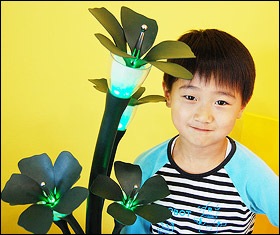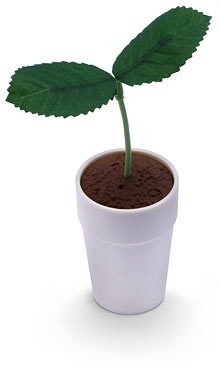Today I stumbled upon two interesting news that made me remember the good old days of the Biosphera project. Different research teams tried to build a robotic plant that could behave like an organic plant.
One of the plant was developed by a Korean team, at Chonnam National University. The robotic plant has has humidifying, oxygen-producing, aroma-emitting, and kinetic functions. The robot was developed using characteristics of plants normally grown for ornamental purposes. It is 130 cm tall and 40 cm in diameter and consists of a pot, a stem, and five buds of a flower reminiscent of a rose of Sharon.

The second model was developed by Sega and it is called Pekoppa Robot Plant. It looks surprisingly lifelike but never needs watering or sunlight… what it craves is your attention. Talk to your Pekoppa plant and it responds to your voice by bending and moving in a very lifelike manner.

What I like about these two projects is that designers are increasingly more interested in plants as interaction objects. For centuries they have been delicate and vulnerable beings that did not interact at all with superior species. However, there is something primal in their essence that has always captured the attention and fascinations of humans (besides sustaining human life on earth). I also like the idea of a robo plant. In my digital seed project, I was using virtual characters to help kids interact with plants and learn about life science. However, the virtual elements of my design destroyed completely the tangible experience you could have with physical plants. I bet with a robo plant it would be completely different.
Biography:
M. Cherubini. Microworlds for ecology explorations: From DigitalSeed to Biosphera in fostering children’s understanding of plant biology. Master’s thesis, St. Patrick’s College, Dublin City University, Ireland, May 2004. [PDF]
M. Cherubini, H. Gash and T.J.J. McCloughlin The Digital Seed: An interactive toy for investigating plant growth and the generalized plant life cycle., Journal of Biological Education, Institute of Biology Press, London, 2008
